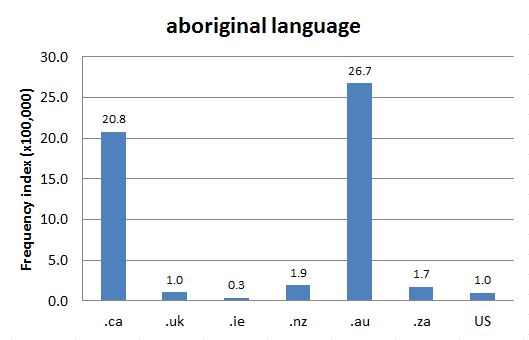DCHP-2
Aboriginal language Aboriginal language DCHP-2 (July 2017)
n. — Aboriginal, especially First Nations
a language of the First Nations, Métis or Inuit peoples of Canada.
Type: 4. Culturally Significant — The term aboriginal language in the Canadian context refers to any of approximately sixty individual languages spoken by the indigenous peoples of Canada (see Canadian Encyclopedia, s.v. "Aboriginal Languages of Canada"). These individual languages fall under eleven language families, listed on Indigenous Foundations (see reference) as follows: Algonquian, Athapaskan, Eskimo-Aleut, Haida, Iroquoian, Ktunaxa (Kutenai), Salishan, Siouan, Tlingit, Tsimshian and Wakashan. The largest family is Algonquian, which includes Cree, Ojibwe (Anishinaabemowin), and Mi'kmaq; the second-largest is Inuktitut (see also Inuit, meaning 3) (see Statistics Canada reference). Figures indicate that the term aboriginal language is used frequently in Canada as well as Australia, where the term aboriginal is also used in reference to indigenous peoples (see Chart 1).
The rapid decline of aboriginal languages is of great concern today. As a result of the devastating impact of assimilation attempts by the Canadian government throughout the country's history until very recently (see, e.g., residential school), aboriginal children were forced to abandon their mother tongues in favour of English (see Indigenous Foundations reference). The long-term effects of this trauma can be seen in the limited number of people that identify one of the aboriginal languages as their mother tongue or as a language used as their home language (see Statistics Canada reference).
British Columbia is home to the vast majority of the Canadian aboriginal languages. While successful programs teaching and documenting aboriginal languages exist, e.g. for Musqueam in Vancouver (see First Nations and Endangered Languages Program reference), the odds are presently still stacked against the survival of most of these languages (see, e.g. the 2007 quotation).See also: Indian (meaning 4) residential school Inuit heritage language assimilation Aboriginal home language official language First Nations language
References:
- First Nations and Endangered Languages Program FNEL Accessed 5 Nov. 2015
- Indigenous Foundations "Languages" Accessed 29 Jul. 2015
- Statistics Canada "Aboriginal Languages in Canada" Accessed 29 Jul. 2015
Images:
Chart 1: Internet Domain Search, 7 Aug. 2015
